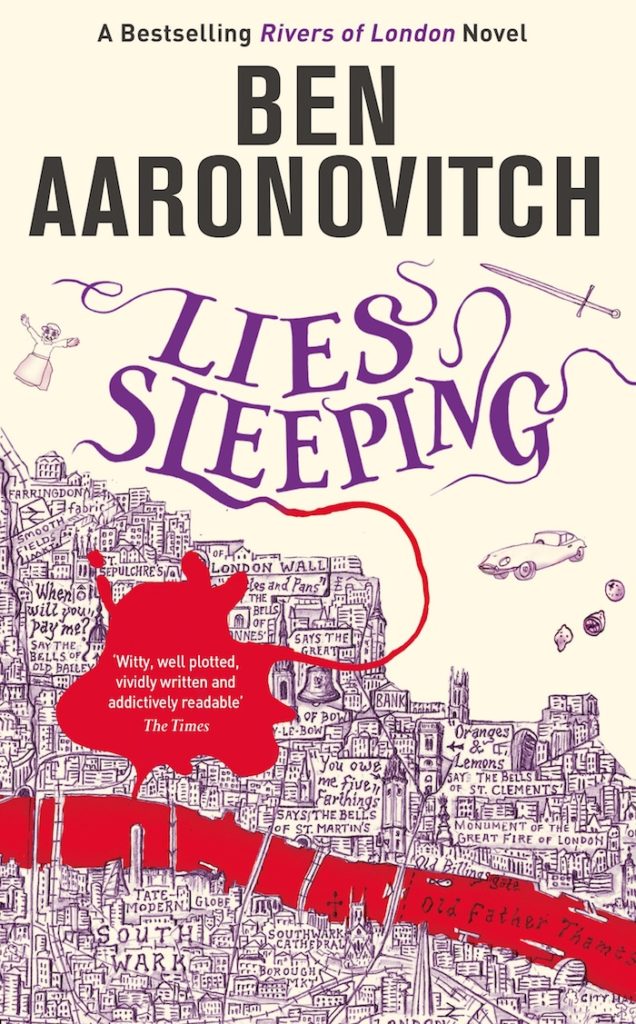Lies Sleeping and the Challenge of Crafting an Intersectional Narrator for the Rivers of London Series
We talked to Rivers of London author Ben Aaronovitch about writing about intersectional identities beyond his own experiences and identity.
Lies Sleeping, the latest installment in Ben Aaronovitch’s Rivers of London series is out November 20th. The series follows Probationary Constable Peter Grant in his journey to magical detective-hood.
As a newcomer to Ben Aaronovitch’s Rivers of London series about a London-based detective solving supernatural crimes, one of the things that surprised me most about the British book series is the rich intersectionality of narrator-protagonist PC Peter Grant.
Grant is the son of a white British jazz musician and a Fula mother from Sierra Leone. Peter doesn’t identify himself as “black” in the pages of Lies Sleeping, but he very much identifies himself as the child of an African mother, and he identifies “whites” as “other.” That gives him a unique worldview for the paranormal mystery genre, but it’s not his sole identifier. He’s also a magical practitioner, a detective constable (by Lies Sleeping), the boyfriend of a river goddess, an SFF fan, and an atheist (despite, or perhaps because of, dating a goddess).
I recently finished reading the excellent Writing the Other, a guide for writers hoping to create realistic characters who don’t share their worldview. This is in contrast to writers of the #OwnVoices movement, who are writing about underrepresented characters or communities informed by their own experiences and identity. The book has inspired courses for writers hoping to better their own fiction by understanding how to write nuanced and fully-fleshed characters from different backgrounds, particularly those of race, (sexual) orientation, age, ability, religion, and sex (termed ROAARS traits). Authors Nisi Shawl and Cynthia Ward discuss the “unmarked state,” or assumed characteristics of most point of view characters (very frequently in fiction white, straight, young, able-bodied, male), and make note that the idea of the unmarked state is itself problematic.
Aaronovitch, through Peter’s worldview, does an excellent job of subverting the idea that any of the common traits that define a “normal” character can be assumed. Part of this is how Aaronovitch counters expectations through naming conventions. Dr. Abdul Haqq Walid’s name likely causes readers to assume, on first encounter, that Walid is of Middle Eastern extraction. Instead, Walid is a Scot who converted to Islam, and is described as a “gingery” man in his late fifties. But a larger part is in Peter’s narration:
“When dealing with the excessively rich and privileged, you’ve got your two basic approaches. One is to go in hard and deliberately working class. A regional accent is always a plus in this…. That approach only works if the subject suffers from residual middle-class guilt—unfortunately the properly posh, the nouveau riche and senior legal professionals are rarely prey to such weaknesses. For them you have to go in obliquely and with maximum Downton Abbey.
Fortunately for us we have just the man.”

Peter establishes characteristics here of both the man they’re going to be questioning (later described as a “big, wide, white man with the heft that the naturally fat get when they exercise like mad in middle age”) and Peter’s superior, Detective Chief Inspector Thomas Nightingale.
Further reading: The Best New Fantasy Books
Obviously, readers who have been with the series for a long time will be familiar with Nightingale, who serves both as Peter’s boss in the police force and as his mentor. But the comparison—Nightingale as a man who would be perfectly suited to appearing in a very posh television program—reinforces the idea that Nightingale comes from privilege through his race, sex, class, and magical background.
There are a few jokes about cultural differences both Peter and his river goddess girlfriend Bev have from contemporary white culture. Upon seeing a movie with a white female protagonist, Peter comments that both he and Bev find “her inability to control her fourteen year old goth daughter … hilariously white.”
Throughout the narration, it’s always mentioned if a character being encountered is white, defying the traditional narrative perception that, by default, a character’s race is white unless otherwise mentioned. It’s never jarring, and I might not have noticed it had I not just finished Writing the Other, but the refusal to accept “white” as the unmarked state is a subtle and point-of-view appropriate way to remind the audience both of Peter’s intersectionality and the intersectionality of London as a whole.
Ben Aaronovitch told Den of Geek about the origins of Peter’s character.
“Way back when the books were but a twinkle in my eye and I was kicking a TV format idea around in my head by the name of Magic Cops, the protagonist was to have been called Simone. She, like Peter, would have been a young PC just finishing her probationary period and would have a friend/rival called Lesley, but unlike Peter was a British woman of Jamaican descent. When I shifted to prose, I wasn’t confident enough of my abilities to write a woman in close first person, which is a very intimate viewpoint. So Simone became a man, and around that time Peter Grant arrived in my head complete with jazz legend father and Sierra Leonean mother. He’s been stuck there ever since.”
Peter’s heritage is underscored by the importance the Sierra Leonean community plays in the narrative, particularly in a very brief encounter with Peter’s cousin just before interviewing a person of interest, but also in his visits to his mother’s house.
“I grew up in a mixed area of London and I had a ton of friends whose parents were from Sierra Leone, Ghana and Nigeria. I naturally retained many of those links as grew older so when I chose Peter’s background, I was confident enough to make his mum Sierra Leonean,” Aaronovitch told Den of Geek when we asked about his research in creating an authentic view of the London Sierra Leonean community. “My research mostly involves phoning up people I know and demanding recipes and random bits of Krio translation. Some friends of mine have accused me of basing Mama Thames, Fleet, and Lady Ty on their relatives but I deny everything.”
But in creating other characters outside his own worldview, Aaronovitch had to dig deeper. “Guleed on the other hand was much trickier. I wasn’t familiar with the Somali community. I literally had to go around accosting complete strangers for help—something I’ve never liked doing,” he explained. “I hope I haven’t made too many mistakes.”
Creating a London that reflected the real London’s diversity was an intentional choice. “Having spent so many years in the racial straitjacket of British TV, working in prose gave me an opportunity to write London as it is, to me at least, as opposed to the city imagined by posh white provincials,” Aaronovitch explained. When doing so required research, he gathered his sources. “I grew up knowing loads of people from West African families, and so I could write people with their background with confidence. I knew fewer lesbians, so I needed to actively gather more information, and I didn’t know any police officers at all, so I had to start from scratch with them.”
Peter’s race, and the way he points out the race of others, is just one aspect of his identity. They are an important aspect, and present throughout the novel, but they are of no greater importance in how Peter views himself than his identity as a Londoner and the quintessential Britishness of his narration.
Also central to his identity are his chosen profession as a police officer and his calling in the practice of magic. Both Sherlock Holmes and Harry Dresden’s detectives would feel at home talking shop with Peter (and it wouldn’t surprise me a bit, if Holmes existed in Peter’s world as a historical figure, he’d have been a wizard himself.)
If Peter ever had any problem navigating the world of magic, or believing in its existence, by Lies Sleeping, he’s well beyond that. He also has no trouble differentiating between the metaphysical and the esoteric. When in a discussion about whether or not he believes in God, his colleague brings up what he views as evidence for the divine:
“‘After the shit we’ve seen? … You can do magic, Peter,’ said Carey. ‘You can shoot fireballs out of your fingers and your girlfriend is a river. That kind of shit. Like possessed BMWs and just all of it. All of that shit.’
‘That’s different,’ I said. ‘That shit is real.'”
He’s also a technophile—he finds a place to stake-out a building based on it being the only position where he can get good wi-fi—and a fan of science fiction and fantasy, both on screen and in print. His pop culture references are spot on. He identifies the quality of a script that’s evidence in his case as “straight to Netflix”; a picture of Sir Isaac Newton, in his own hair, makes the famous scientist and magician “a dead ringer for Ian McDiarmid in Revenge of the Sith—just before Samuel L. Jackson rearranges his face for him.”
Peter readily (and quite geekily) identifies a tattoo in Tolkien’s dwarvish script as the Peter Jackson film version, rather than Tolkien’s original. He describes “a misspent youth playing role-playing games,” and, after escaping a situation in which his captors provided him with a copy of The Silmarillion to read, downloads a copy to his phone so he can finally finish it.
In many ways, Peter’s existence as a reader and a fan of the genre in which his stories take place are a different idea of the “unmarked state.” Genre readers are likely to understand his references—if not all of them. I had to ask my husband, who has actually finished The Silmarillion, if the jokes while Peter is reading it makes sense; but then, I’ve attempted The Buried Giant and bounced off if it, just like Peter, while my husband has not. While genre readers and watchers may have vastly different views on particular books and films Peter mentions, they will take it as absolutely normal that Peter himself has opinions on those works. (When asked, Aaronovitch said Peter’s top two recommendations in genre books and film would be Guard, Guards by Sir Terry Pratchett and season three of Farscape.)
Aaronovitch has accomplished some amazing world-building in the Rivers of London series, and his diligence in research shows. When discussing how he conducts that research, Aaronovitch told Den of Geek: “For me, the hierarchy of research sources goes from best to worse: Direct contact with real people. Accounts written by real people about themselves (this is often the best you can get for historical information). Accounts written about real people by people you trust. Accounts written about real people whose biases you can allow for. Fiction written by people about people like themselves. Fiction written about people by people not like themselves. Television documentaries. Television drama.”
Aaronovitch has accomplished some amazing world-building in the Rivers of London series. His mystery pacing in Lies Sleeping, which dips wonderfully into Arthurian legends as a plot point as well, is excellent for a novel this late in a series, leaving time for continued world-building and character development as the plot moves forward.
But it’s Peter’s intersectionality, which is to say the richness and complexity of his character across so many aspects, that is truly remarkable. As far as this (white/cis/female/straight/able-bodied) reviewer can tell, Aaronovitch either has some remarkable life experiences I’ve not been able to uncover, or he’s done some in-depth, quality research of his own. I’ll absolutely be eager to read more of Peter’s adventures!
Read the Rivers of London Series by Ben Aaronovitch
Alana Joli Abbott writes about books for Den of Geek. Read more of her work here.
